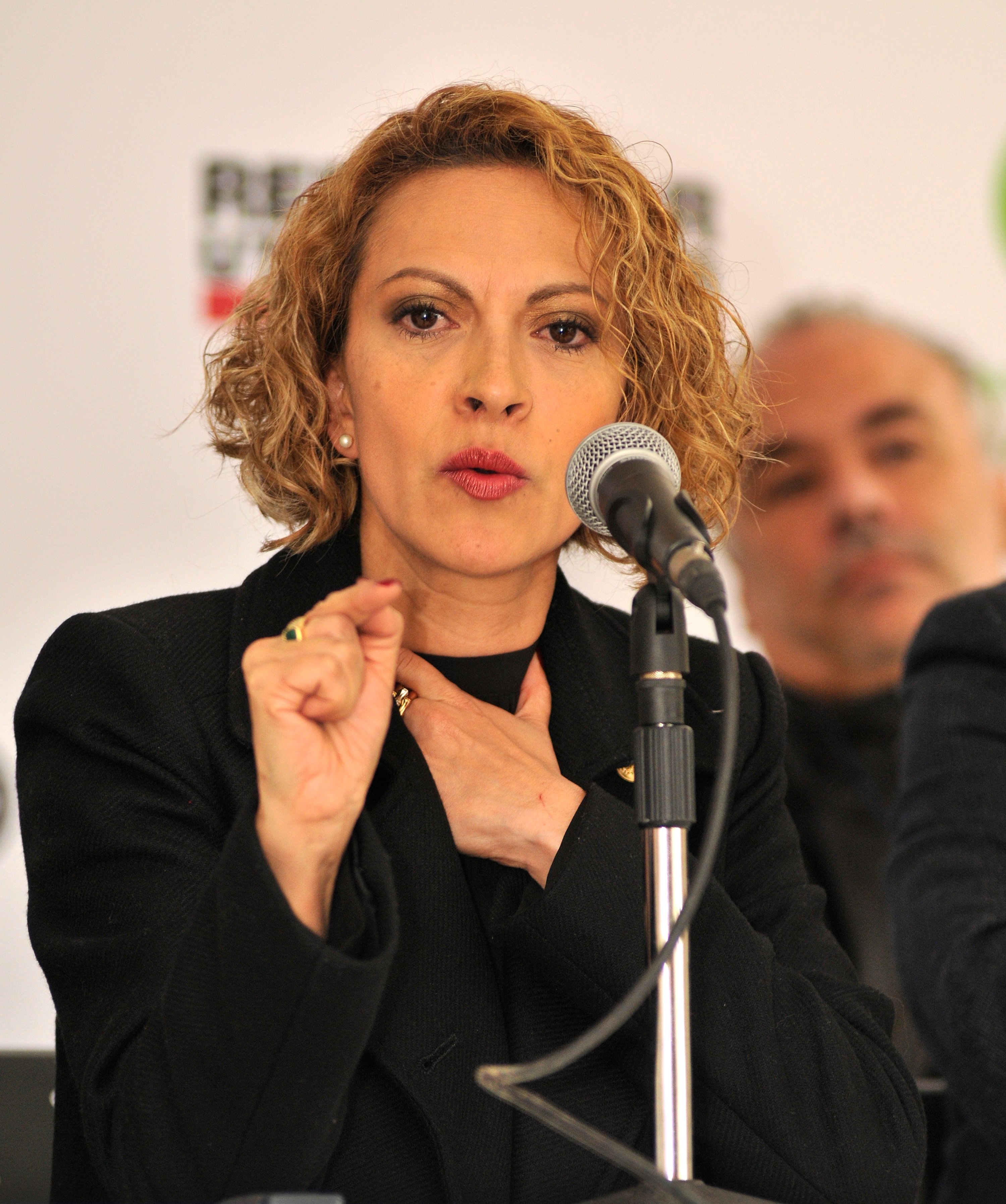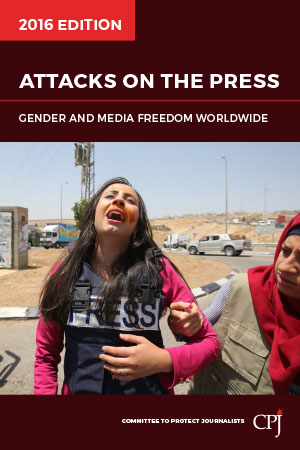To rewrite one’s story, when it is so painful, feels like a kind of suicide. Psychologists would say that is part of a grieving process, helping close nefarious chapters in life. We, the victims of sexual violence, are often told that. But I think it would be more helpful to the goal of moving forward if receiving justice were part of the process.
My last 15 years and six months have been a mixture of pain, anger, infinite love for my work, obstinacy and, yes, hopelessness. I have tried to be patient and willing since that day, May 25, 2000, when I was kidnapped at the gates of La Modelo prison in Bogotá. My patient deliberation has led me to recognize myself as a victim, then as a survivor, and now as an activist defending the rights of women. Though my patience has not overcome the entanglement of my case in the cobwebs of oblivion, it has given me the strength to not falter while continuing to live and work.
In 2010, I published a book, I Speak to You from the Prison, which is a small collection of stories about men and women in Colombian jails. There is a part of my own story in the book, because on the day that I was kidnapped at La Modelo, I lost my most precious freedom. It was the freedom to dream.
At the time, I was a young writer in Bogotá who wanted to swallow the world. I didn’t care if I only slept two hours at night or ate once a day. I only cared about walking the cold floors of Paloquemao, Bogotá’s biggest court complex, to hear the news of the city’s latest crimes, or entering the infernal La Modelo to research stories for the pages of the newspaper El Espectador.
The La Modelo prison was considered one of the most dangerous in the world, overcrowded to an unbelievable 197 percent of its capacity. The prisoners slept on top of each other and the biggest criminal enterprises in the country-arms trafficking, kidnapping, forced disappearance, drug trafficking and extortion-were centered there.
During my visits to La Modelo, in addition to the human drama, I crashed head-on into the corrupt and indiscriminate reality of arms trafficking and kidnapping. The prison’s large criminal network was being directed under the auspices of high officials of the security forces (the police and the army), though at that time I had no idea this was the case. Now that I see it clearly, there is no room for regret over what I should not have done-or rather, what I should have never investigated. There is no turning back the clock.
I believed that my stories were changing the world. But the criminals who kidnapped me were the actors in a plan to shut me up. My audacity to mess with that criminal web almost cost me my life, and left a deep wound that today, 15 years later, is far from closed.

Journalists are accustomed to writing the stories of others, which may make it harder for us to write our own. I was raped during my kidnapping, and one day I was asked in an interview what it was like and if I could recount it. So I decided to write about it, to go back to my pain and tragedy without allowing it to become a tabloid episode. The problem is that we journalists often believe we have no right to make our feelings public.
The arms trafficking network I discovered inside La Modelo was an empire of unimaginable size and complexity. Within it, I found terrible scenes of displaced women, partners of both paramilitaries and guerrillas, even simple visitors who were sexually abused. It was another outcropping of Colombia’s decay, though for me it was very far from everyday life.
But that journalistic work proved to be costly, and led to retaliation because I touched the wrong person. On that May morning, I came to the door of La Modelo looking for an interview with a paramilitary figure and ended up drugged and gagged in the back of a truck heading to hell.
At first, I did not understand what was happening. I thought they had been ordered by Carlos Castaño, the top leader of the Autodefensas Unidas de Colombia (a paramilitary and drug trafficking group), to ask me why I was publishing so many stories about him, or why I had revealed this network of arms trafficking within the prison, in complicity with some members of the National Police and the National Institute of Corrections.
I speculated, in a whirlwind of thoughts and ideas about what was happening, while I was choking on my own vomit. I was dizzy, and when I begged them to let me throw up, they put a tape on my mouth. When I tried to remove the band covering my eyes, I got a kick in the face.
Until then, I thought it was only a beating as a warning, that it would soon be over and I would be able to breathe. But then, the truck stopped in an open field where there were many men.
A few minutes passed and again the subject that had pointed a gun at me at the doors of the jail, the one who had kicked me in the face and had torn strands of my hair while shaking my head, was back. For the umpteenth time, he put his gun to my temple, loaded it, and after hitting me, made me open my eyes as much as I was able. “Look really well at my face, you S.O.B.,” he said. “Look at it because you will never forget it.”
I felt an icy cold throughout my body and fear hit me in the chest. I tried every possible way to stop them from ripping my pants and underwear. I tried to gather all possible strength to make sure they didn’t touch me or come closer to my body, but his other cronies only further plunged me into humiliation. I was only 26 years old and my life had just been shattered by three criminals. They almost broke my left arm and left me with a hematoma from the fingertip to the collarbone. A few hours after the torture, beatings, and outrage, they left me abandoned on a highway, on the road to Puerto López, Meta, three hours from Bogotá.
I wanted to die.
After receiving the help of a taxi driver and being transferred to a clinic, I began to face the disgraceful reality that awaited me. While suffering the examination of forensic medicine, which is really a second rape, I questioned if maybe the fault had been mine. Unfortunately, women who are raped often think that way. Did I wear the wrong blouse? Was it the skirt? Were my clothes showing more than they should? It took me many months to stop feeling filthy and many years to allow a man to touch me again. Such a violation is not like a fist or a blow; it is a crime that destroys our lives.
The second part of the nightmare came as I debated my next reality: Whether to commit suicide or go into exile. In the end, I chose neither. I chose to continue doing journalism in Colombia.
I still do not know where I found the strength to return to the newsroom, to my notes and to my tape recorder. What I do see clearly is what motivated me. I understand now that my love for this profession and for my work as a reporter was greater than the pain of my body and my soul.
It is not easy to write about the Colombian conflict when you know that part of your personal story is recounted daily in the stories of the protagonists of your chronicles, but almost recklessly, I returned to the line of fire. For years, I documented the confrontation between paramilitaries, guerrillas, and military forces. I was a privileged witness to what happened on the battlefield. I knew the color, smell, and sadism of the war. And I decided to keep what happened to me in a drawer, though it was always there, marking and changing my life without mercy.
It was not until 2009, nine years after my kidnapping, that I recognized the necessity of speaking about it, and came to understand that I was among millions of victims of the war in Colombia. It was the result of being asked by the British non-governmental organization OXFAM to be the voice of a report on sexual violence in Colombia.
The process was not easy, and for the next three years, the decision to talk led me to a deep depression that made me think again about suicide. My sense of “me” crumbled again.
Today, I do not know if that’s the price of survival, of having a second chance in life. But I decided to accept it, and a mission emerged from the responsibility to keep on living. And I realized that my voice was not alone anymore. It had become a public outcry, and then a movement, which I named “No es Hora de Callar” (“It’s not time to be silent”). This campaign-my campaign-made me an activist, and led me to mix journalism with the defense of human rights.
It has been a long journey since that day in May of 2000, and it has taken me to many places in the world where I could see myself in the eyes of other survivors of sexual violence. Our bodies and our lives are marked by the brutality we experienced, and our task is to prevent other women from having to face the same thing.
My life is still threatened, my case goes unpunished, and I do not know when those who hurt me 15 years ago will be brought to justice, if ever. But I know that even if I cease to exist, and my work is shut down, it will continue in the voices and lives of thousands of women like me.
My struggle led the president of Colombia, Juan Manuel Santos, to declare May 25- the date of my abduction-National Day for the Dignity of Women Victims of Sexual Violence. That is an acknowledgment. But it is important to take action. Our words, our will, can prevent the silencing of voices, the violation of our freedom of expression, and the violation of women through sexual violence.
The deepest pain led me to understand that my strength was in words. My words saved me because they gave meaning to my life. To those who read this today, I want to say that their words can transform the lives of others. Words can indeed change the world. And we, as journalists, have a huge responsibility in this regard. Our words can stir a fight or bury the hope of change forever.
Translated from Spanish by Wilson Vega
Jineth Bedoya Lima is deputy editor of Colombian newspaper El Tiempo.
